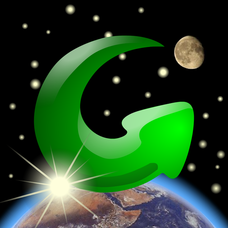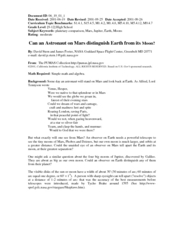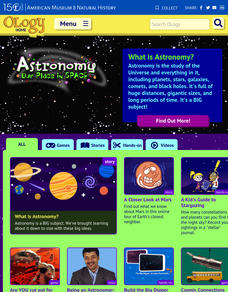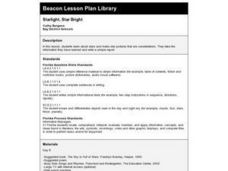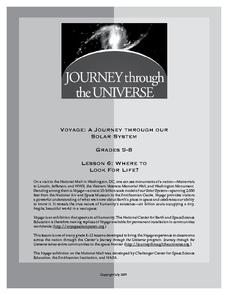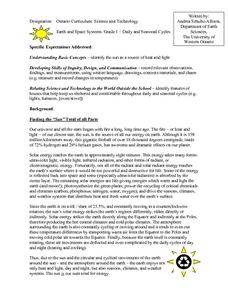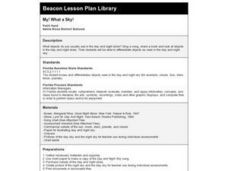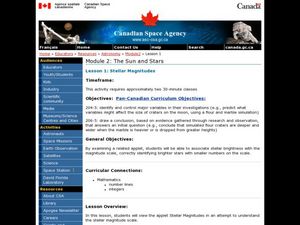GoSoftWorks
GoSkyWatch Planetarium for iPad - The Astronomy Star Guide
Digital compass alignment enables navigation of the skies with true orientation at any time. Just point to the sky or "aim for the stars!" This application acts as a virtual telescope, allowing you to zoom in on any object that is...
Space Awareness
Sun, Earth and Moon Model
The moon orbits Earth while the Earth is rotating, and the Earth revolves around the sun. This can be a tricky concept for young astronomers. Implement an activity that helps distinguish between the movements of Earth's systems around...
Curated OER
Doin' The Moonwalk
If you are looking for an outstanding lesson on the Moon for your budding astronomers, look no further! This outstanding plan is full of wonderful, meaningful activities for your charges to engage in. Pupils will discover why there are...
Curated OER
Exploring the Moon
First graders complete an experiment illustrating why the moon appears to change over time using a flashlight and ball. Students discuss the shape of the moon and identify it as a sphere. Students write a short informational piece after...
Curated OER
Can an Astronaut on Mars Distinguish Earth from its Moon?
Learners explore the possibility of being on Mars and being able to identify the Earth. In this space lesson students complete a set of calculations to see if this is possible.
American Museum of Natural History
Planetary Mysteries
A website all about planetary mysteries—it's a one-stop-shop for all things, stars, planets, and space travel. Scholars read an astronomy overview to discover the page's big ideas, then choose from the plethora of resources, including...
Curated OER
Sky 4: The Moon
Students will draw the moon's shape for each evening on a calendar and then determine the pattern in the shapes over several weeks. Students' understandings should be confined to observations, descriptions, and finding patterns.
Curated OER
How Big Are Earth, Sun, and Moon?
Third graders draw what they believe is in space on a dry erase board. In groups, they are given a beaker half filled with water and they add a teaspoon of oil, observing the different layers that form. To end the lesson, they identify...
Glynn County School System
Light, History, Gravity, Distance, Relativity, and Space-Time
Let the star's color be the guide! The color of a star indicates its temperature and its mass and distance affect the gravitational force. The lesson presentations address these concepts as well as how the theory of special relativity...
Curated OER
Starlight, Star Bright
First graders read books and use the Internet to identify several constellations and stars in the night sky. They make star pictures and write a class report about the night sky including a title, complete sentences and a cited reference.
Journey Through the Universe
Where to Look For Life?
Every year we discover new planets including more than 1,000 in 2016 alone. Will we ever find life on another planet? The lesson includes two activities to help scholars understand this concept. First, they analyze the temperature range...
Curated OER
What's Up?
Students compare and contrast the various heavenly bodies found in the sky at night. They identify the moon and stars in the sky as well as how the stars form pictures called constellations. Students also experiment with reflection and...
Curated OER
Identifying Figurative Language #1
In this identifying types of figurative language worksheet, students read sentences and phrases, determine if they are similes, metaphors, hyperboles, personifications, or a combination, identify the type/s and write an explanation of...
Curated OER
Space Science
Eighth graders study the objects in our solar system. In this space lesson students identify and describe planets, then classify them as terrestrial or gaseous.
Curated OER
Daily and Seasonal Cycles
First graders identify the sun as a source of heat and light. They identify features of houses that help keep use sheltered and comfortable throughout daily and seasonal cycles. Students are told that summer is the best season to...
Space Awareness
Know Your Planets
Does your class know their planets? Implement an activity that has them describing the solar system, identifying properties of the planets, and placing them in order from their distance from the sun.
Curated OER
Moons
Students practice rote counting to 20. After a lecture about the planets and the moons that surround them, they identify the number of moons surrounding various planets. Students compare and contrast the quantity of moons surrounding...
Curated OER
Exploration of the Moon
In this moon worksheet, high schoolers review the Clementine exploration of the Earth's moon. This worksheet has 8 matching and 14 true or false questions.
Curated OER
My! What a Sky!
First graders read "Goodnight Moon" or "Day And Night" and discuss what they see in day and night skies. They read and sing lyrics to the "Day and Night" song. They identify objects in the sky as day or night objects. They illustrate day...
Curated OER
The Starry Night Time and Day Time
Second graders complete a unit of lessons on the solar system. They complete various art projects inspired by Van Gogh's 'Starry Night,' create a moon phases book, create a moon phase wind chime, develop a timeline of space exploration,...
Curated OER
Scavenger Hunt: Who am I?
In this space science worksheet, learners use the sites listed on the Solar System and Planets page of the Kid Zone to locate the names of the people credited with each discovery. They identify and name 26 different scientists who made...
Curated OER
Sky Pictures
Students investigate constellations. In this space science lesson, students view transparencies of constellations and identify the zodiac constellations. Students research the legends connected with the constellations.
Curated OER
Stellar Magnitudes
Students analyze the stellar magnitude scale. In this stellar magnitude lesson, students examine the stellar magnitude scale. Students predict the Sun's magnitude from various planets.
Curated OER
Our Sky Clock
Students explore space science by completing a worksheet in class. In this astronomy lesson, students discuss and identify star patterns in the night sky and relate these patterns to the approximate time they appear. Students complete an...


